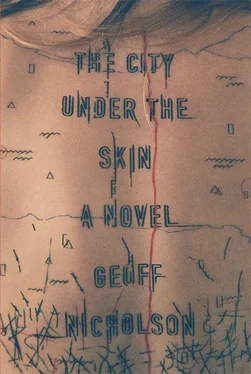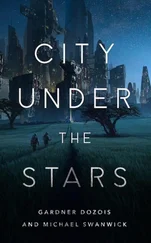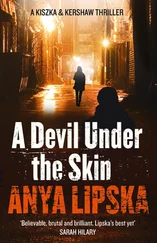Geoff Nicholson
The City Under the Skin
“Now when I was a little chap I had a passion for maps … At that time there were many blank spaces on the earth, and when I saw one that looked particularly inviting on a map (but they all look that) I would put my finger on it and say, When I grow up I will go there.”
— Joseph Conrad, Heart of Darkness
The old man was walking to his car. He was dapper, sedate, serious, wearing a dark navy blazer, a plume of silver handkerchief rising from his breast pocket. His hair, similarly silver, glinted in the lights of the underground parking lot. There was only the slightest hesitancy in his step, and although he carried a walking cane — lacquered mahogany with a silver head in the shape of a globe — it might well have been just for show.
Another man stood in the shadow of a broad concrete pillar. He was a big man, but there was something compacted about him, so that his considerable size and weight didn’t suggest fatness but a concentration of flesh and energy. His face was flat, and carved into frown lines. His eyes were grave and sly. His name was Wrobleski. He watched the old man as he approached his car and produced the key. Wrobleski smoothed down his jacket. Some guys liked to put on special gear when they worked; wraparound shades, scarves, black kid gloves, but Wrobleski was not “some guy.” He preferred to wear a good suit — though not too good, given the task ahead.
The old man matched his vehicle: it was Wrobleski’s experience that they always did. They both looked sleek, polished, well-appointed, but maybe a little sluggish. Wrobleski stepped out of the shadow, hands by his sides, his face heavy but open, and he walked over to the old man.
“Nice ride,” he said, nodding toward the car.
The old man looked just a little surprised to find someone suddenly standing so close to him. He’d assumed he was alone. Even so, he was unruffled. He nodded back in agreement. Yes, it was a nice ride.
“What kind of mileage do you get from this thing?”
“I have no idea,” the old man said suavely, demonstrating that he didn’t have to care about such things.
“Right,” said Wrobleski, “you’re my kind of guy.”
“I doubt that,” said the old man; and then, “Do I know you?”
“My name’s Wrobleski.”
The old man did his best not to react, though that wasn’t easy. A slight stiffening of his bottom lip was all that showed.
“Really?” he said. “Wrobleski?”
“You’ve heard of me.”
“Yes, but I thought you were just an ugly rumor.”
“If only.”
“And you’re here to kill me?”
“Very good. It’s easier if we both know what’s going on.”
“I don’t think so,” the old man said calmly. “I think you’ve made a mistake.”
“I really don’t make mistakes.”
The old man’s eyes skimmed around him, from recessed shadow to bright burns of artificial light. Both men knew there was nothing to be seen, no escape routes, no panic buttons, no Good Samaritans. The security cameras had been put out of commission.
“Why exactly?” the old man said.
“Because I’m being paid to.”
“That’s no answer.”
It would have to do. Wrobleski wondered if the old man was going to make a run for it: some of these old guys prided themselves on being fit. He also wondered if he might have a gun on him: some of them liked to think they could defend themselves. They were always wrong about that. But by then Wrobleski had his own gun in his hand and he fired it into the old man’s right leg. The draped flannel of the pants and the flesh beneath splashed open and the victim sank to one knee.
“Oh good God,” the old man said quietly, and he grabbed his injured leg with one hand, his chest with the other. Wrobleski wondered if he might be having a heart attack. Well, wouldn’t that be a joke?
The old man didn’t have the strength to remain kneeling: he fell over onto his side, gasping for air.
“Couldn’t you do it ‘execution style’?” he sneered gamely.
“But where’s the sport in that?” said Wrobleski.
He fired again, into the other leg. The impact straightened the old man out, left him lying horizontally, legs apart, both arms now clutched to his torso. His car key was lying on the ground a couple of feet away, and Wrobleski picked it up and unlocked the car. He reached inside, popped open the trunk, then scooped up the wounded man and folded him into the trunk, as if he were a ventriloquist’s dummy. It was easy: there was plenty of room in there. It could have been designed for it. He slammed the lid shut.
“You all right in there?” Wrobleski yelled.
The voice from inside said something that answered the question, however unintelligibly. Wrobleski only needed to know that the old man was still breathing, still able to feel.
He got in the driver’s seat, started the car, revved the engine just a little, selected reverse, then floored the accelerator, so that the vehicle shot backward at speed, across to the wall on the other side of the parking lot. The trunk slammed into the pale, rubber-streaked concrete. Wrobleski was pretty sure that once would be enough, but he did it again anyway, just to be sure. Then he got out, surveyed the damage, the crushing and crumpling of the car’s bodywork, which indicated similar damage to the old man.
Wrobleski gave no signal, made no phone call, but precisely as arranged and scheduled, a tow truck lurched down the ramp from the parking level above and positioned itself in front of the damaged car. A young, long-limbed black man in indigo overalls levered himself out of the cab and walked languidly to the back of the truck, where he began hooking up the old man’s car.
“Thank you, Akim,” Wrobleski said to the driver with exaggerated formality; then added, “It’s good to see a man who believes in the dignity of labor.”
Wrobleski scrutinized the area where he’d driven the car into the wall. There were various liquids smeared across the concrete floor, pools and rivulets, forming a pattern, a not quite random design, that to a certain kind of eye might look like the map of some undiscovered country. Satisfied that none of the liquids were blood, he allowed himself a small flicker of pride at a job well done.
2. WHAT THE SOCIAL WORKER SAID
She said, “This is a rather unconventional living arrangement you have here, Mr. Moore.”
“Thanks,” said Billy Moore, and he gave her a smile that he knew in most circumstances would be read as charming. He understood that he had a good face: trustworthy to a degree; pale, strong, hard-edged; the face of a tough guy but a decent one. He was also wearing an unfamiliar, uncharacteristic, brand-new white shirt, so fresh out of the pack that the folds still showed. The scarlet tie he wore with it felt like a noose. He wondered if the woman was trained to notice things like that, if she could tell he was a man who normally wore a beautifully scuffed leather jacket.
“I didn’t necessarily mean it as a compliment,” said the social worker.
“I didn’t really take it as one,” said Billy. “I was being flippant.”
The social worker, Mrs. Janet Marcus (“Call me Jan”), was a large, well-padded woman on the lower slopes of middle age. She seemed, worked hard at seeming, warm, sympathetic, perhaps even motherly, but she sounded less than warm or sympathetic when she said, “It’s probably better not to be flippant in the current circumstances, Mr. Moore.”
“Right. I guess I’m nervous.”
“There’s no need to be.”
“Isn’t there? You’re here to check on my parenting skills. You’ve got the power to take my daughter away from me. That makes me nervous.”
Читать дальше












